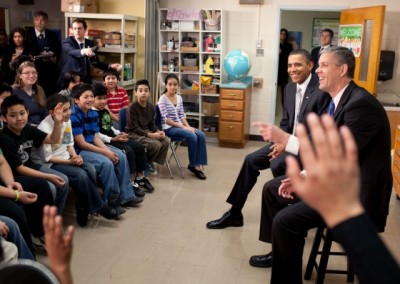
President Barack Obama and Secretary of Education Arne Duncan with Sixth-Graders in Virginia (courtesy of the White House)
Delaware and Tennessee have received competitive grants from the Obama administration’s Race to the Top competition, it’s interesting to see a variety of reactions about the program emerging. Always, there is plenty of blame to toss around in states that lost out. Winners and losers are still emerging as states gear up for the next awards in June.
Always, there are critics. For example, Rick Hess, the educator, political scientist and author of the Education Week blog Rick Hess Straight Up, says the program is a good idea, but the execution has been faulty.
“I think doing it through a competitive grant makes sense but I think the sum is large, the program is so novel, and the opportunities for getting it wrong are so great that it’s important to be incredibly thoughtful to get it right and I’m worried we’ve fallen short on that count,” Hess told the Ohio Gadfly.
Hess added that the program has not been buffered from politicians, and that the scoring “is based on hot fads of the moment and buzz words rather than knocking down outdated policies and anachronistic practice.”
Hess also said guidelines for spending and applications have been too vague.
The New York Times, on the other hand, praised the program in an editorial and proclaimed that it is already a success, noting that Race to the Top “already has had a huge, beneficial effect on the education reform effort, especially at the state and local levels.”
“The Race to the Top initiative won’t solve this country’s education problems by itself, but it is focusing attention on the right issues and moving them up the national agenda,” the editorial concludes.
— Liz Willen



